|
|
|
Sort Order |
|
|
|
Items / Page
|
|
|
|
|
|
|
| Srl | Item |
| 1 |
ID:
140836
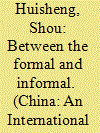

|
|
|
|
|
| Summary/Abstract |
Official efforts to improve rural governance in China have been confronted with resistance not only from local leaders but, interestingly, from rural residents as well. Two problems have jointly prevented these efforts from being effective: agency problems associated with formal institutions that split the interests of village leaders against their community, and collective action problems facing rural residents who are unable to defend their interests through horizontal societal networks. These two problems, working in tandem, allow village leaders to, ironically, enhance their control without being subject to state supervision and popular pressure. Some recent progresses have helped bridge the formal and informal institutions for greater accountability of rural leaders, although persistent challenges suggest an uncertain future for rural governance.
|
|
|
|
|
|
|
|
|
|
|
|
|
|
|
|
| 2 |
ID:
140841
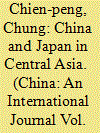

|
|
|
|
|
| Summary/Abstract |
Central Asia is a region where both China and Japan would like to pursue greater roles and interests. Largely initiated by China, the Shanghai Cooperation Organisation has enhanced China’s influence in Central Asia. This has caused concern for Japan, which then sought to expand its presence in the region. Through meetings and dialogues with Central Asian leaders, and by providing aid and loans to states in the region, leaders of China and Japan have been trying to obtain contracts for extracting oil, natural gas, rare metals, uranium and other minerals from Central Asian states, and secure peace in Afghanistan.
|
|
|
|
|
|
|
|
|
|
|
|
|
|
|
|
| 3 |
ID:
140838
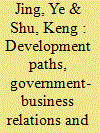

|
|
|
|
|
| Summary/Abstract |
Faced with the rising threat of social instability, the central government in China has launched the rebuilding of social security system since 2002. Local governments, especially city- and county-level governments, are the principal agents implementing this ambitious policy initiative. However, the achievements in establishing social security system vary significantly, even among locales in the same province. In order to identify the factors causing divergence of outcomes, this article compares two similar county-level cities with different social security system performances. Through extensive interviews with key actors, the authors found that the development of local social security system is highly related to the nature of the relationship between local governments and local businesses which is shaped by specific economic development paths. This finding sheds light on the rationale of local governments’ selective implementation of central policies, and why social security systems in some localities but not others may “race to the bottom” in the competition for capital.
|
|
|
|
|
|
|
|
|
|
|
|
|
|
|
|
| 4 |
ID:
140844


|
|
|
|
|
| Summary/Abstract |
The purpose of this article is to analyse the work-value clusters across 31 regions in China by applying Hofstede’s five dimensions framework. Following a thorough literature survey, the authors identified 21 factors to explain cultural differences. Of these, 19 could possibly explain differences in work values among regions in China. Subsequent data analysis suggests that China can appropriately be grouped into two or three work-value clusters depending on the work value dimensions applied. Regional differences suggest two main clusters derived from the dimensions of individualism, power distance, uncertainty avoidance and long-term orientation, while when masculinity is also considered, three clusters emerge.
|
|
|
|
|
|
|
|
|
|
|
|
|
|
|
|
| 5 |
ID:
140842
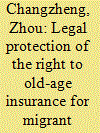

|
|
|
|
|
| Summary/Abstract |
China’s main comparative advantage in international competition is its cheap labour, mostly migrant workers from rural areas. Migrant workers play an important role in the economic development of China. Since 1978 when China began to adopt the reform and opening-up policy, more and more migrant workers have poured into cities and towns to seek better employment opportunities. However, besides low wages, they have to endure long working hours and dangerous working environments. In addition, many employers do not contribute social insurance for migrant workers at all, leaving them vulnerable to unexpected living costs. According to a survey conducted in the Yangtze Delta Region by the Legal Aid Program for Migrant Workers at Nanjing University in August 2009, only 39.3 per cent of migrant workers have pension schemes, and 31.5 per cent of migrant workers have not joined any social insurance schemes of any sort. In some cities such as Wenzhou, even fewer are covered, as only 15.4 per cent of migrant workers have a pension scheme and 50 per cent of migrant workers have not joined any social insurance scheme. When migrant workers become old, sick, unemployed or injured in industrial accidents, they fall into poverty because they cannot apply for social insurance benefits. Among these problematic issues, old-age insurance should be specifically highlighted because more migrant workers are reaching their retirement age. There has been an increasing number of pension cases filed at the courts of law. However, many courts refuse to proceed with the hearings of these social insurance cases, or apply inappropriate legal doctrines in the trial process. It is also almost impossible for migrant workers to get legal redress for their pension benefits when their employers fail to comply with the law and contribute fees for them. It is imperative for the Chinese government to unify the old-age insurance system countrywide.
|
|
|
|
|
|
|
|
|
|
|
|
|
|
|
|
| 6 |
ID:
140839
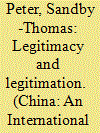

|
|
|
|
|
| Summary/Abstract |
The “puzzle” of why the Communist Party of China (CPC) remains in power has produced a number of competing and complementary explanations. Of these, legitimacy has gained much attention in recent years. While largely convincing, the Weberian-influenced approach, with its focus on economic growth and nationalism, is unable to explain a number of incongruities in contemporary China. Consequently, this has provoked a turn towards empirical methods. Again, though highly informative, these methods also suffer shortcomings, not least whether they are measuring legitimacy. Given this, this article proposes the concept of legitimation to complement these existing approaches for the purpose of enhancing our understanding of why the regime remains in power.
|
|
|
|
|
|
|
|
|
|
|
|
|
|
|
|
| 7 |
ID:
140840


|
|
|
|
|
| Summary/Abstract |
In the past decade, Chinese officials, scholars and journalists have made the term “shiminhua” a buzzword in discussions of the country’s urbanisation. An innovation of writers from the People’s Republic of China (PRC), the term relates to the problem of turning new urban residents into full members of the community, in legal, sociological, attitudinal and/or economic senses. The term is cited to legitimate or contest policies directed at those on the margins of cities. Rather than offering a definition, or even a single English translation, this article tries to make sense of shiminhua by linking it to several themes. Laden with ambiguities, problematic assumptions and elite prejudice, the term is of little analytic value. Nonetheless, rhetoric about shiminhua cuts to the core of conflicts over legitimate membership in urban communities. The term’s use offers a window into debates over major issues in China’s political and social development, including the extent of police control, legitimation of social stratification and the sort of welfare regime the country should build.
|
|
|
|
|
|
|
|
|
|
|
|
|
|
|
|
| 8 |
ID:
140843
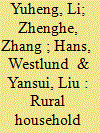

|
|
|
|
|
| Summary/Abstract |
This article aims to investigate the evidence of spatio-temporal disparity in rural household income at the provincial level in China during the 1978–2007 period. A research framework is developed to study the transitional processes of decentralisation, marketisation, urbanisation and globalisation. By computing the Moran’s I index and using the spatial regression model, the findings indicate a highly clustered, spatio-temporal disparity in rural household income across the eastern, central and western regions in China during the post-reform era. Rural household income tends to be higher in the eastern provinces in comparison to inland provinces. This disparity is attributed to the impacts from the institutional, economic, social and external transitions that become increasingly significant in the recent decades in China.
|
|
|
|
|
|
|
|
|
|
|
|
|
|
|
|
| 9 |
ID:
140835
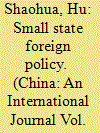

|
|
|
|
|
| Summary/Abstract |
Despite the post-World War II emergence of many small states and growing economic interdependence, small state foreign policy still gets short shrift in international studies. This article seeks to enhance our understanding of the subject by examining the diplomatic recognition of Taiwan. At the time of writing, 23 countries in the world have picked Taiwan over China. This is puzzling at first sight, since China is much more powerful than Taiwan, and a vast majority of countries pick China over Taiwan. This article shows that a full understanding must simultaneously take into account the systemic, domestic and individual levels of analysis. This research lends itself to structural realism, which stresses the role of structural factors in foreign policies, especially among small states. On the domestic level of analysis, this study identifies three important factors: ideology, economy and geography. For structural and cultural reasons, major leaders of Taiwan’s diplomatic allies are found to have loomed large in the diplomatic recognition of Taiwan.
|
|
|
|
|
|
|
|
|
|
|
|
|
|
|
|
| 10 |
ID:
140837


|
|
|
|
|
| Summary/Abstract |
In 2004, an outbreak of occupational disease in several battery factories in south China led to the cadmium poisoning of hundreds of women workers. Drawing connections between the works of Alfred Schutz and Giorgio Agamben, this article suggests that the lives of cadmium-poisoned victims offer an illustration of the concept of “stranger”, which can be understood as a specific form of “bare life” in contemporary China. Evidence from in-depth interviews and group meetings with dozens of victims revealed not only their physical pain, but also their experience of social estrangement due to a lack of understanding from their significant others and the uphill struggle for compensation. Fieldwork was conducted during the 2010–12 period both in the home villages/towns to which victims had returned and in Guangdong where they stayed behind and fought for their rights. The victims’ experience of sustained estrangement sheds light on contemporary state power that exercises prerogative in silencing the victims rather than enforcing the rule of law.
|
|
|
|
|
|
|
|
|
|
|
|
|
|
|
|
|
|
|
|
|